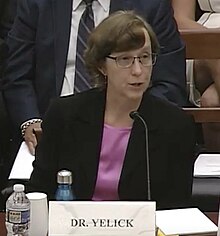|
Katherine Yelick
Katherine "Kathy" Anne Yelick, an American computer scientist, is the vice chancellor for research and the Robert S. Pepper Professor of Electrical Engineering and Computer Sciences at the University of California, Berkeley.[1] She is also a faculty scientist at Lawrence Berkeley National Laboratory, where she was Associate Laboratory Director for Computing Sciences from 2010–2019.[2] Education and scientific careerKatherine Yelick received her SB, SM, and PhD in computer science from the Massachusetts Institute of Technology, completing her thesis in 1990. She joined the faculty at the University of California, Berkeley in 1991, and was appointed a joint-appointment faculty research scientist at Lawrence Berkeley National Laboratory in 1996. She has done research across a broad range of computing sciences: high performance computing, systems programming, parallel algorithms, and computational genomics. Yelick is known for her work in partitioned global address space programming languages, including co-inventing the Unified Parallel C (UPC) and Titanium languages.[3] She was a co-author of the first book to explain the language Unified Parallel C and its use.[4] She also led the Sparsity project,[5] the first automatically tuned library for sparse matrix kernels, and she co-led the development of the Optimized Sparse Kernel Interface (OSKI).[6] Academic and Research LeadershipYelick served from 2008 to 2012 as the director of the National Energy Research Scientific Computing Center (NERSC), the scientific computing center that provides high-performance computing facilities and associated expertise to over 9,000 scientists supported by the U.S. Department of Energy Office of Science.[7] In 2010, she was appointed the Associate Laboratory Director for Computing Sciences at Berkeley Lab, overseeing NERSC, the high-speed research network Energy Sciences Network (ESnet), and the Computing Research Division. In this role she managed an organization with a research budget of about $150 million. In her role as associate laboratory director, Yelick led the development of the 2019 Computing Sciences Strategic Plan for Berkeley Lab. In the introduction to that plan, she said:
She also led a major initiative, Machine Learning (ML) for Science, in which researchers developed advanced machine learning tools to accelerate discovery in a wide range of scientific disciplines.[8] In 2021, Yelick delivered the inaugural lecture in the distinguished lecture series at the Harvard Institute for Applied Computational Science, with the title "Machine Learning in Science: Applications, Algorithms, and Architectures."[9] Since 2021, Yelick has served as the vice chancellor for research (VCR) at the University of California, Berkeley.[10] In this role, she provides the primary leadership in research policy, planning, and administration, and also leads university-industry relations, research compliance, research communications, and federal research development. The VCR supervises over fifty campus research units, twelve research museums and remote field stations, and the research administration offices. The research enterprise at UC Berkeley attracted $871 million in extramural support in the fiscal year ending June 30, 2022.[11] Awards and honorsFrom 2012 to 2015, Yelick received three awards from the Association for Computing Machinery (ACM).
In 2017 Yelick was elected to both the National Academy of Engineering[15] and to the American Academy of Arts and Sciences.[16] The NAE award was "for software innovation and leadership in high-performance computing." The American Academy citation said that "her research enables use of new high-performance architectures and eases programming of applications with irregular communication patterns." The following year she was elected as a fellow of the American Association for the Advancement of Science.[17] At the 2019 ACM/IEEE Supercomputing Conference SC19 Yelick was honored by HPCwire as their Editor’s Choice for Outstanding Leadership in HPC.[18] National serviceYelick serves on the executive committee for the Division on Engineering and Physical Sciences of the National Academies of Sciences, Engineering, and Medicine (NASEM).[19] This Division provides independent and authoritative advice to the federal government and the nation on important science and technology policy issues in the areas of national security, space and aerospace, energy, infrastructure, manufacturing, materials, physics, astronomy, mathematics and operations research, information technology, and telecommunications. Yelick is the chair of the NASEM study committee on Post-Exascale Computing for the National Nuclear Security Administration.[20] Congress requested this study in the 2021 National Defense Authorization Act, charging it with "reviewing the future of computing beyond exascale computing to meet national security needs at the National Nuclear Security Administration." Personal lifeYelick is married to University of California, Berkeley professor James Demmel, who is also an ACM Fellow and works in computer science and numerical linear algebra.[21] References
|
||||||||||||||||||||||
